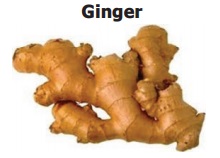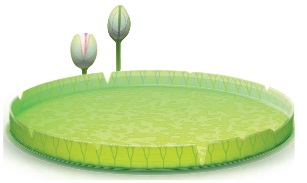The Living World of Plants | Term 1 Unit 4 | 6th Science - Student Activities | 6th Science : Term 1 Unit 4 : The Living World of Plants
Chapter: 6th Science : Term 1 Unit 4 : The Living World of Plants
Student Activities
Think it

Is it a Root or stem?
Answer: It is stem.
Activity 1
Water absorption by Root
Aim:- To observe absorption of water by root
What you need? A carrot, a glass of water and blue ink.
What to do? Place a carrot in a glass of water with a few drops of blue ink. Leave the carrot in water for two to three days. Then cut the carrot into half length wise and observe.
What do you learn? Blue colour appears in carrot which indicates water moves up wards in the carrot showing that root conducts water.
Activity 2
Conduction of water
Aim:-To observe conduction of water by stem.
What you need? A small twig of balsam plant, a glass of water and a few drops of red ink
What to do? Place the small twig in the water with red ink.
What do you see? The stem be-comes reddish.
What do you learn? This is because red coloured water is being taken by the stem upwards.
Victoria amazonica, the leaves of this plant grow up to 3 metres across. A mature Victoria leaf can support an evenly distributed Load of 45 Kilograms or apparently young person.

Activity 3
The teacher will divide students into four groups. Each group leader will pull a plant part from a “hat” (roots, stems, leaves, and flower). The teacher will take students around campus to search for their assigned plant parts. They have to locate different types of plants discussed in the class room. The learner will return to the class, follow a process sheet given to create a poster with their group and identify correctly each type of root, stem, or leaf observed. The flower group will create a poster by identifying correctly each part of the flower. Each group will share their posters within the class.
Activity 4
Read the following story along with your friend
Once, I was a happy monkey. I lived in a beautiful thick forest with my mother and two brothers. We ran and played in the lush grass. On one hot day, I fell fast asleep in the cool shade of a tree. Suddenly the bright sun woke me up. I opened my eyes and could not believe what I saw everything has changed. Everything had been destroyed. I stood and looked at the stumps that used to be trees. Nothing was left apart from hard dry ground and only streets and building
I saw a deer that looked very sad, “where have all the trees gone and where are all the other animals?” I asked her. She explained how humans had chopped down all the trees, but had not planted new ones to replace them. After a while, I said good bye to deer. My home had gone. I didn’t know where my family was, and I was starting to feel hungry and thirsty, day and night. I walked in search for water, food and safe place to sleep. Whenever I stopped, to rest humans drove me away with sticks and angry voices. I could feel my body getting weak and tired. One day when I had almost given all the hope, I came across a cool and dark forest. As I walked through it, I found plenty of food and water. The forest felt safe for me. There were no signs of human visiting it.
* Why did the monkey feel sad?
The monkey feel sad because the forest was destroyed.
* Who chopped the trees?
Humans chopped the trees.
* Which is the safest place for monkey to live?
Forest is the safest place for monkey to live.
* What is a habitat?
A dwelling place is called habitat.
Fact file
Thar Desert, also called Great Indian Desert, is an arid region of rolling sand hills on the Indian subcontinent. It is located partly in Rajasthan state, north-western India, and partly in Punjab and Sindh (Sind) provinces, eastern Pakistan.
Activity 5
Visit a nearby nursery. Choose any ten varieties of plants and place them under the appropriate habitats.
World habitat day is observed on 1st Monday of October.
Activity 6
Field Investigation
Name of the student
Date
Location
Plant types to be observed
1. A tendril climber
2. A twiner
3. A plant with thorn
Tabulate the modification that you have observed in these plants
HOTS
Cactus plant is green in colour and performs photosynthesis. Which part of the plant does photosynthesis?
Answer: Stem
Related Topics